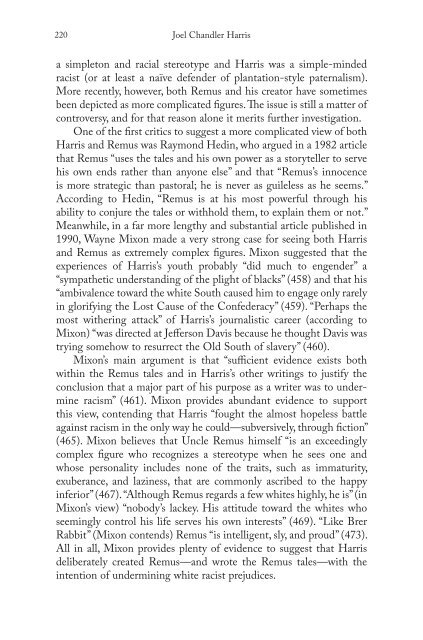Blooms Literary Themes - THE TRICKSTER.pdf - ymerleksi - home
Blooms Literary Themes - THE TRICKSTER.pdf - ymerleksi - home
Blooms Literary Themes - THE TRICKSTER.pdf - ymerleksi - home
You also want an ePaper? Increase the reach of your titles
YUMPU automatically turns print PDFs into web optimized ePapers that Google loves.
220<br />
Joel Chandler Harris<br />
a simpleton and racial stereotype and Harris was a simple-minded<br />
racist (or at least a naïve defender of plantation-style paternalism).<br />
More recently, however, both Remus and his creator have sometimes<br />
been depicted as more complicated fi gures. Th e issue is still a matter of<br />
controversy, and for that reason alone it merits further investigation.<br />
One of the fi rst critics to suggest a more complicated view of both<br />
Harris and Remus was Raymond Hedin, who argued in a 1982 article<br />
that Remus “uses the tales and his own power as a storyteller to serve<br />
his own ends rather than anyone else” and that “Remus’s innocence<br />
is more strategic than pastoral; he is never as guileless as he seems.”<br />
According to Hedin, “Remus is at his most powerful through his<br />
ability to conjure the tales or withhold them, to explain them or not.”<br />
Meanwhile, in a far more lengthy and substantial article published in<br />
1990, Wayne Mixon made a very strong case for seeing both Harris<br />
and Remus as extremely complex fi gures. Mixon suggested that the<br />
experiences of Harris’s youth probably “did much to engender” a<br />
“sympathetic understanding of the plight of blacks” (458) and that his<br />
“ambivalence toward the white South caused him to engage only rarely<br />
in glorifying the Lost Cause of the Confederacy” (459). “Perhaps the<br />
most withering attack” of Harris’s journalistic career (according to<br />
Mixon) “was directed at Jeff erson Davis because he thought Davis was<br />
trying somehow to resurrect the Old South of slavery” (460).<br />
Mixon’s main argument is that “suffi cient evidence exists both<br />
within the Remus tales and in Harris’s other writings to justify the<br />
conclusion that a major part of his purpose as a writer was to undermine<br />
racism” (461). Mixon provides abundant evidence to support<br />
this view, contending that Harris “fought the almost hopeless battle<br />
against racism in the only way he could—subversively, through fi ction”<br />
(465). Mixon believes that Uncle Remus himself “is an exceedingly<br />
complex fi gure who recognizes a stereotype when he sees one and<br />
whose personality includes none of the traits, such as immaturity,<br />
exuberance, and laziness, that are commonly ascribed to the happy<br />
inferior” (467). “Although Remus regards a few whites highly, he is” (in<br />
Mixon’s view) “nobody’s lackey. His attitude toward the whites who<br />
seemingly control his life serves his own interests” (469). “Like Brer<br />
Rabbit” (Mixon contends) Remus “is intelligent, sly, and proud” (473).<br />
All in all, Mixon provides plenty of evidence to suggest that Harris<br />
deliberately created Remus—and wrote the Remus tales—with the<br />
intention of undermining white racist prejudices.

















